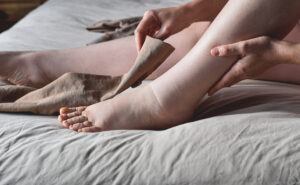Lymphedema after mastectomy is a condition that causes swelling of the extremities, most often the legs and ankles, but it can happen on any part of the body. Lymphedema is painful and dangerous when left untreated. Some people manage their pain by having specialized massages performed a few times a week, and others have to have special wraps done on their legs.
Lymphedema in the Leg with a DVT
DVT is the acronym used for deep vein thrombosis, otherwise known as a blood clot. Generally speaking, those who have DVTs or have had a history of them are not eligible for the massages, which makes their condition much more intolerable and uncomfortable.
These people must have their legs wrapped in a specific way so as to draw the fluid from the ankle upward. The best pain relief for this type of lymphedema is to keep the leg elevated over the heart as much as possible. This will decrease the fluid build-up that occurs as a result of blocked lymph ducts.
Lymphedema After Mastectomy: Wrapping Leg

Walk for Thirty Minutes Each Day
Believe it or not, you can help your condition greatly by keeping your legs mobile. Even though it may hurt a bit, take a pain pill and go for a walk at least three times per week. No one said to run a marathon, so take it easy. The idea is to keep those limbs moving and increase your circulation. If possible, be sure someone is with you while you walk. If you must go alone, do so during the day in a well-populated area, and take a walker with you; the kind with the seat is ideal in case you need a rest.
There is no cure for lymphedema after mastectomy and most people will suffer from it chronically for the rest of their lives. There are many health complications that can develop because of this illness, so it is important to talk everything over with your doctor and get all the facts. Knowing your risk factors and how to decrease them is a good way to keep yourself healthy, in spite of your condition.
For inquiries, please email our office at [email protected], and we will send a quick reply will be sent about your condition. If you require a personal consultation that requires an appointment, please call the office today at 416-782-5353.


